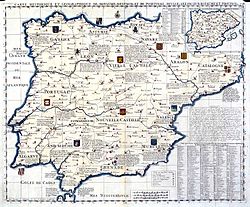| Part of a series on |
| LGBTQ topics |
|---|
|
|
| History of Spain |
|---|
 |
| Timeline |
| Part of a series on |
| Francoism |
|---|
 |
Lesbians in Francoist Spain had to contend with a culture where a fascist state met with a form of conservative Roman Catholicism to impose very rigid, traditional gender roles. In the immediate post-Civil War period, the new regime was not concerned with homosexuals in general, but instead were focused on changing laws to enforce restrictive gender norms like repealing divorce. While original laws banning homosexuality were on the books and enforced using a 1933 law, they were changed in 1954 and 1970. Unlike male homosexuality, lesbians were less clearly addressed by these laws and were much less frequently prosecuted for the crime of homosexuality. Lesbians from that period are hard to identify because they were not identified as such, and often identified as prostitutes instead.
Lesbians were repressed in Spain, using cultural, religious, psychiatric and medical institutions to facilitate this repression. During the Franco period, lesbians were forced into an inescapable closet that sometimes led to suicide. Consequently, lesbian culture was pushed underground. Women had to meet clandestinely and use code words to identify each other. They created their own unique family units, married men or had fake marriages to gay men. Some entered convents. Being outed posed dangers, including that they would be subjected to electroshock treatment as part of conversion therapy. Still, lesbians threw parties, went to the movies, and, starting the year Franco died, they created their own bar scene. Oculto sendero by Elena Fortún and the lesbian poetry of Lucía Sánchez Saornil were the most important works of early lesbian literature of this period, before the lesbian literary movement really began to take off in 1964 with works like Ana María Matute's 1964 novel The Soldiers Cry at Night (Spanish: Los soldados lloran de noche)
An independent history of lesbianism as a political movement in Spain does not begin until 1975, the year Franco died, as lesbian voices had been intentionally silenced prior to this. In this early period a transition to democracy, the voices of gay men were often louder with lesbians playing important support roles because of historically greater past gay male visibility and continuing patriarchy. In 1977, Barcelona-based Front d'Alliberament Gai de Catalunya (FAGC) became the first gay men's organization to have a lesbian section. The first lesbian organization, Grup de Lluita per l'Alliberament de la Dona, in Spain would not be founded until 1979 in Barcelona. Political tensions would see lesbians split from gay men by 1981 and they would not join together again until the early 1990s.
